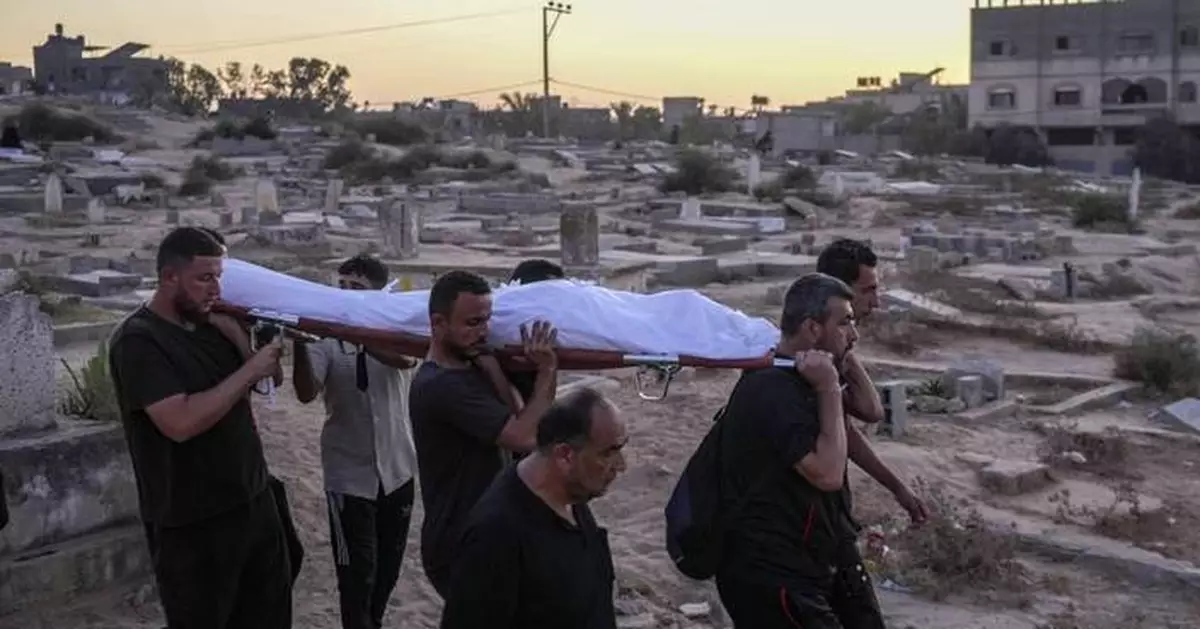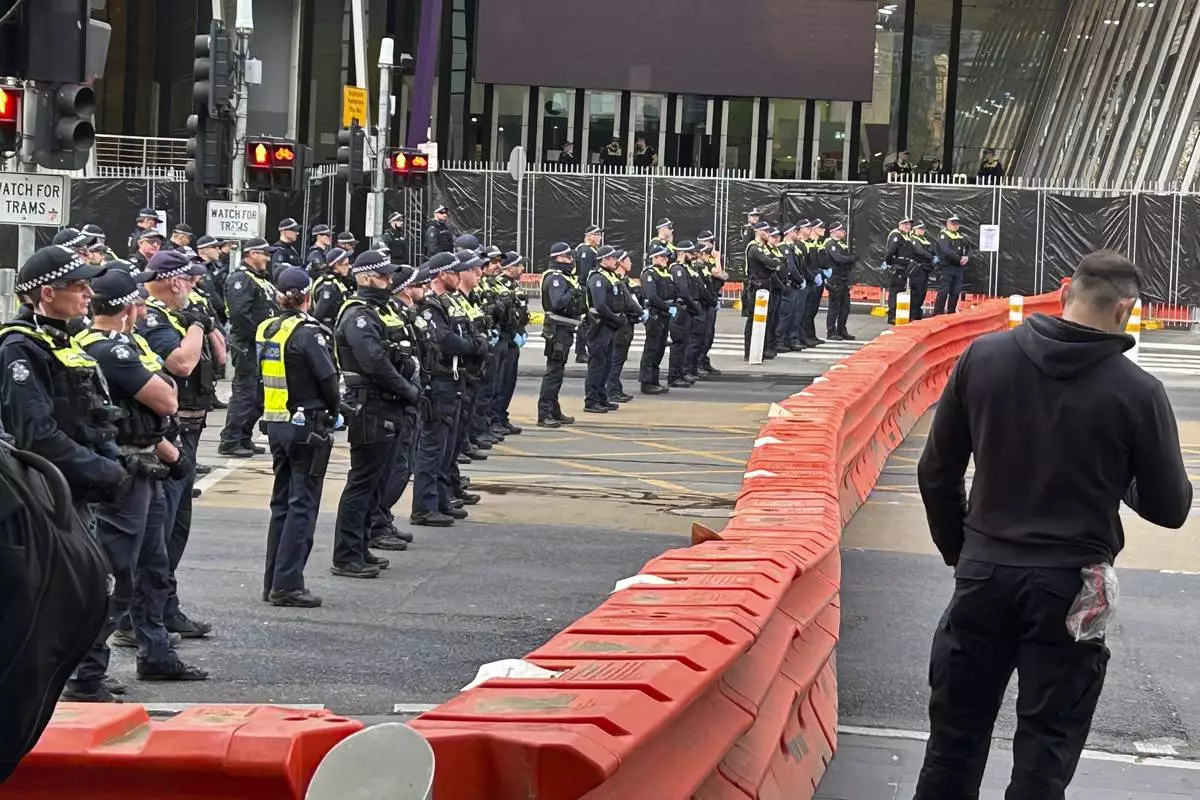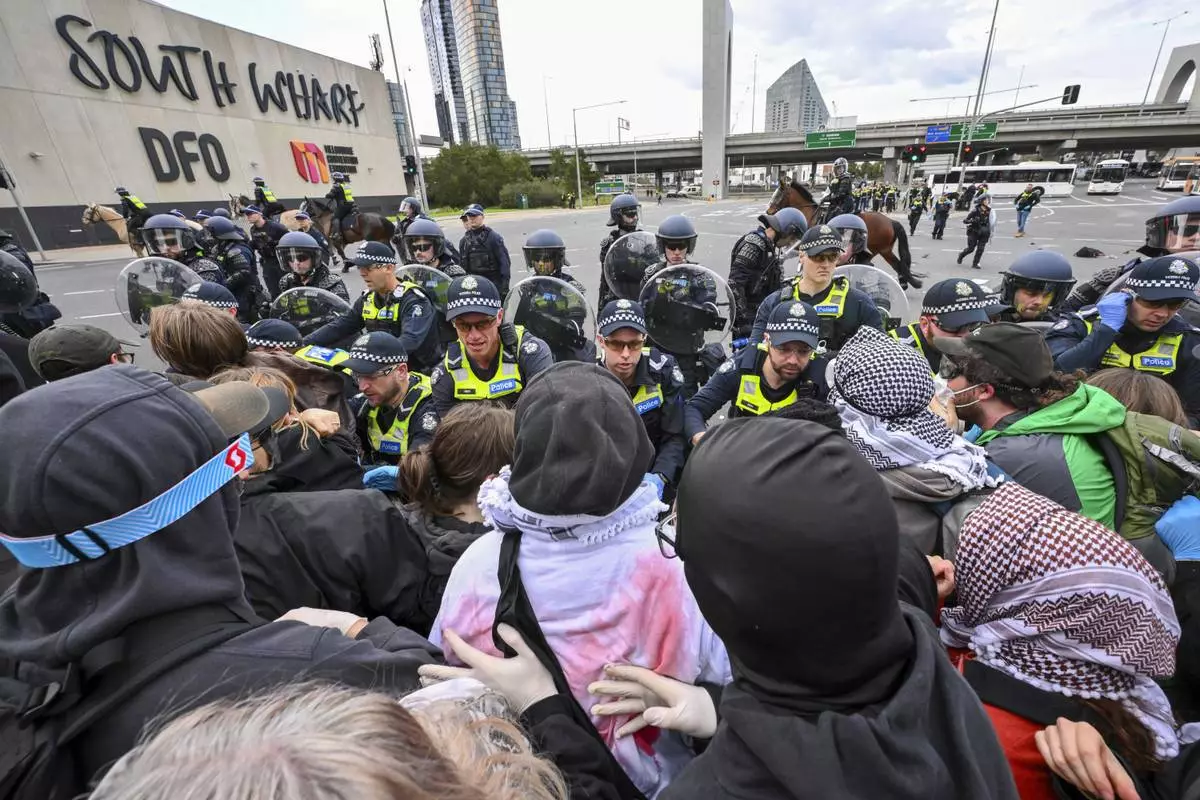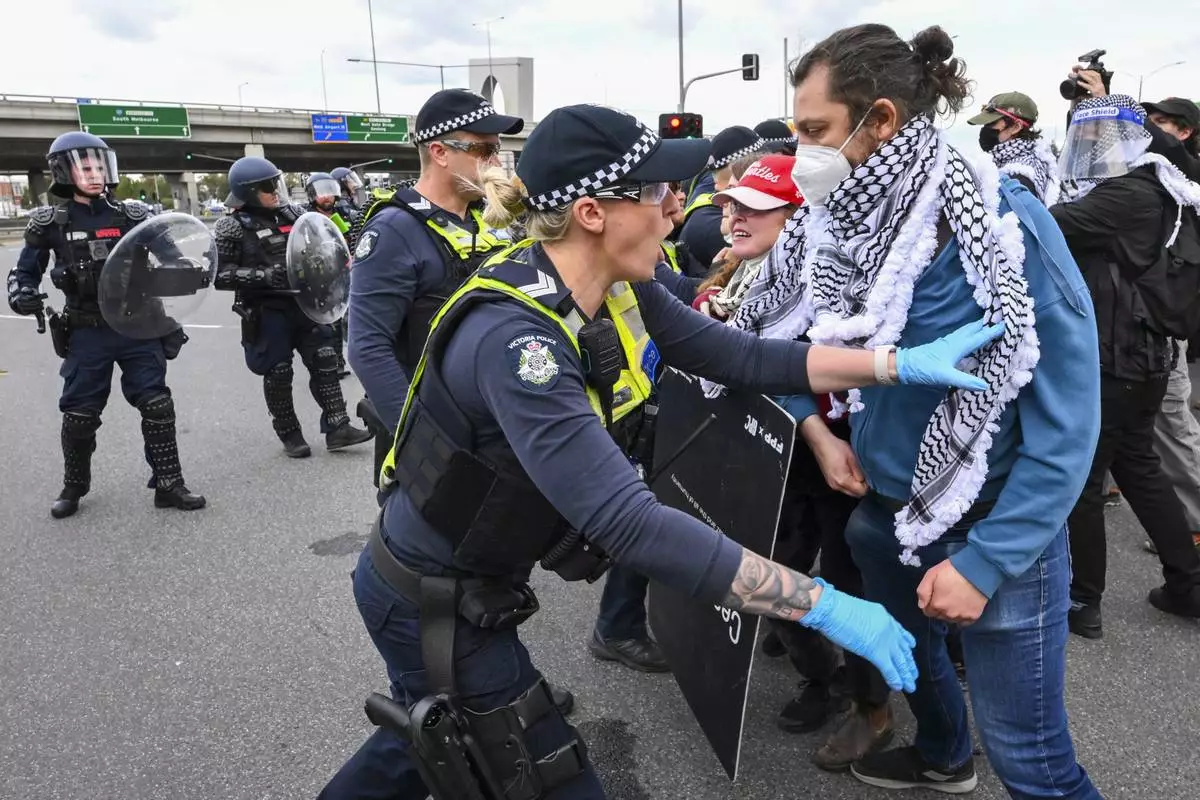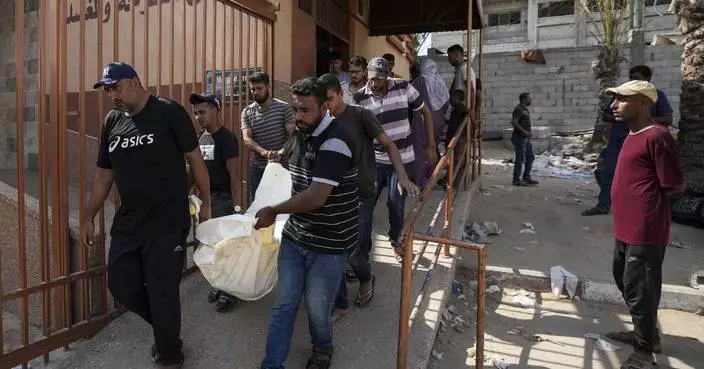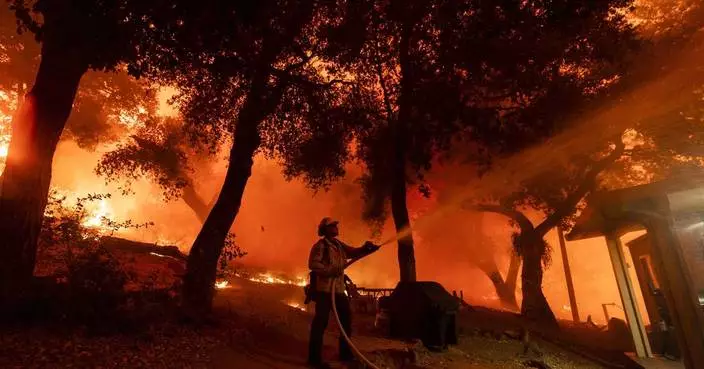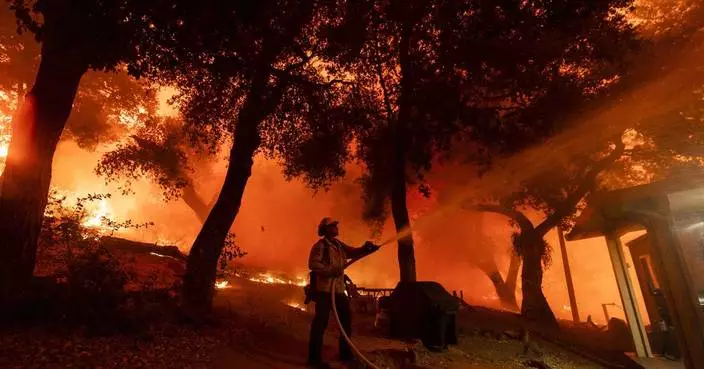DEIR AL-BALAH, Gaza Strip (AP) — Tiers of graves are stacked deep underground in a bloated Gaza cemetery, where Sa’di Baraka spends his days hacking at the earth, making room for more dead.
“Sometimes we make graves on top of graves,” he said.
Baraka and his solemn corps of volunteer gravediggers in the Deir al-Balah cemetery start at sunrise, digging new trenches or reopening existing ones. The dead can sometimes come from kilometers (miles) away, stretches of Gaza where burial grounds are destroyed or unreachable.
The cemetery is 70 years old. A quarter of its graves are new.
The death toll in Gaza since the beginning of the 10-month-old Israel-Hamas war has passed 40,000, according to the Health Ministry in the Hamas-run territory. The count does not distinguish civilians from militants.
The small, densely populated strip of land is now packed with bodies.
They fill morgues and overflow cemeteries. Families, fleeing repeatedly to escape offensives, bury their dead wherever possible: in backyards and parking lots, beneath staircases and along roadsides, according to witness accounts and video footage. Others lie under rubble, their families unsure they will ever be counted.
A steady drumbeat of death since October has claimed nearly 2% of Gaza’s prewar population. Health officials and civil defense workers say the true toll could be thousands more, including bodies under rubble that the United Nations says weighs 40 million tons.
“It seems,” Palestinian author Yousri Alghoul wrote for the Institute for Palestine Studies, “that Gaza’s fate is to become one large cemetery, with its streets, parks, and homes, where the living are merely dead awaiting their turn.”
Israel began striking Gaza after Hamas-led militants stormed across the Israeli border on Oct. 7, killing about 1,200 people and taking some 250 others hostage. Israel seeks Hamas’ destruction and claims it confines its attacks to militants. It blames Hamas for civilian deaths, saying the militants operate from residential neighborhoods laced with tunnels. The fighting has killed 329 Israeli soldiers.
Even in death, Palestinians have been displaced by Israel’s offensives.
Palestinians move corpses, shielding them from the path of war. Israel’s military has dug up, plowed over and bombed more than 20 cemeteries, according to satellite imagery analyzed by investigative outlet Bellingcat. Troops have taken scores of bodies into Israel, searching for hostages. Trucked back to Gaza, the bodies are often decomposed and unidentifiable, buried quickly in a mass grave.
Israel’s military told The Associated Press that it is attempting to rescue hostage bodies where intelligence indicates they may be located. It said bodies determined not to be hostages are returned “with dignity and respect.”
Haneen Salem, a photographer and writer from northern Gaza, has lost over 270 extended family members in bombardments and shelling. Salem said between 15 and 20 of them have been disinterred — some after troops destroyed cemeteries and others moved by relatives out of fear Israeli forces would destroy their graves.
“I don’t know how to explain what it feels like to see the bodies of my loved ones lying on the ground, scattered, a piece of flesh here and bone there,” she said. “After the war, if we remain alive, we will dig a new grave and spread roses and water over it for their good souls.”
In peacetime, Gaza funerals were large family affairs.
The corpse would be washed and wrapped in a shroud, according to Islamic tradition. After prayers over the body at a mosque, a procession would take it to the graveyard, where it would be laid on its right side facing east, toward Mecca.
The rituals are the most basic way to honor the dead, said Hassan Fares. “This does not exist in Gaza.”
Twenty-five members of Fares' family were killed by an airstrike on Oct. 13 in northern Gaza. Without gravediggers available, Fares dug three ditches in a cemetery, burying four cousins, his aunt and his uncle. Survivors whispered quick prayers over the distant hum of warplanes.
Those who died early in the war might have been the lucky ones, Fares said. They had funerals, even if brief.
Nawaf al-Zuriei, a morgue worker at Deir al-Balah’s Al-Aqsa Martyrs Hospital, is on the front lines of the rush of dead. Workers cover the damaged bodies in plastic to avoid bloodstains on white shrouds.
“We wipe the blood off the face so it’s in a suitable state for his loved ones to bid him farewell,” he said.
Following Israeli troop withdrawals, dozens of bodies are left on streets. With fuel scarce, workers collecting the dead fill trucks with corpses, strapping some on top to save gas, said civil defense official Mohammed el-Mougher.
Headstones are rare; some graves are marked with chunks of rubble.
When a corpse remains unidentified, workers place a plastic placard at the grave, bearing the burial date, identification number and where the body was found.
The uncertain fate of relatives' bodies haunts families.
Mousa Jomaa, an orthopedist who lives in al-Ram in the Israeli-occupied West Bank, has watched from afar as the war claimed 21 relatives in Gaza.
Jomaa’s cousin Mohammed was killed in an Israeli airstrike early in the war while operating an ambulance in southern Gaza and was buried in Rafah, away from the family’s home in central Gaza. The cemetery was damaged in a later offensive. There’s no sign of Mohammed’s body, Jomaa said.
A strike in December then destroyed Jomaa’s uncle’s house, killing his aunt and her children, 8-year-old Mira and 10-year-old Omar. Jomaa's uncle, Dr. Hani Jomaa, rushed home to search the rubble. Before he could find Mira's body, a strike killed him too.
Because her body has not been recovered, Mira has not been counted among the dead, said Jomaa, who showed a photo of the young girl standing beside her brother, with a rainbow handbag matching her barrette.
In July, an Israeli tank killed two more cousins, Mohammed and Baha. Baha’s body was torn apart, and the shelling made it too dangerous to collect the remains for weeks.
Jomaa said that come the end of the war, he plans to visit Gaza to search for Mira's remains.
Israeli evacuation orders cover much of Gaza, leaving some of the largest cemeteries off-limits.
Jake Godin, a Bellingcat researcher, has used satellite imagery to document destruction to more than 20 cemeteries. Sandy, bulldozed expanses appear where some cemeteries once stood. Gaza City’s Sheikh Radwan graveyard is cratered. In Gaza's Eastern Cemetery, roads carved by heavy vehicles bury headstones under tire tracks, he said.
“Anywhere the (Israeli military) is active, they bulldoze and destroy the ground without regard to cemeteries,” Godin said.
The military told the AP it does not have a policy of destroying graves. “The unfortunate reality of ground warfare in condensed civilian areas" can result in harm to cemeteries, it said, adding it found Hamas tunnels underneath a cemetery east of the southern city of Khan Younis.
Mahmoud Alkrunz, a student in Turkey, said his father, mother, two brothers, sister and three of his siblings’ children were buried in the Bureij refugee camp’s cemetery after Israel bombed their home.
When Israel withdrew from Bureij in January, the graves were found unearthed. Alkrunz fainted when his uncle delivered the news.
“We don’t know what has happened to the bodies,” he said.
Frankel reported from Jerusalem. AP correspondent Jack Jeffery in Ramallah, West Bank, contributed.
Follow AP’s war coverage at https://apnews.com/hub/israel-hamas-war
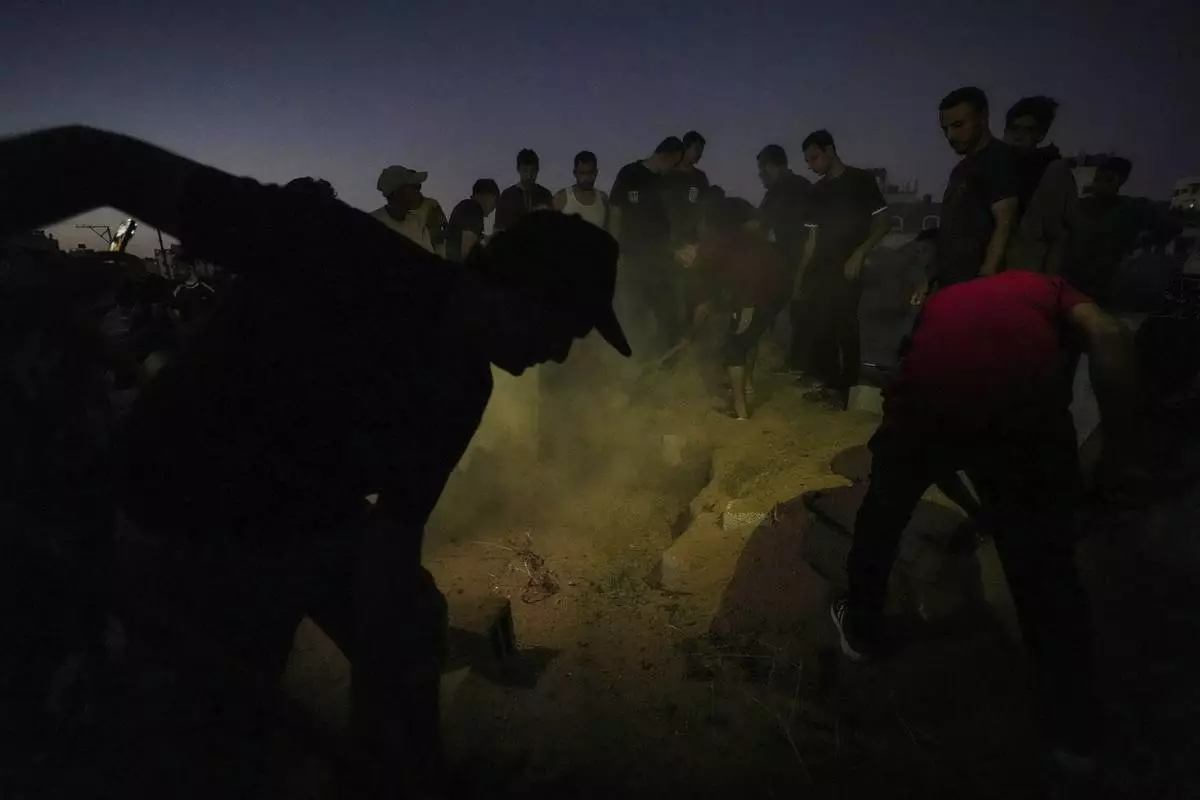
Palestinian mourners bury their loved one at the cemetery in Deir al-Balah, Gaza Strip, Friday, Aug. 9, 2024. (AP Photo/Abdel Kareem Hana)
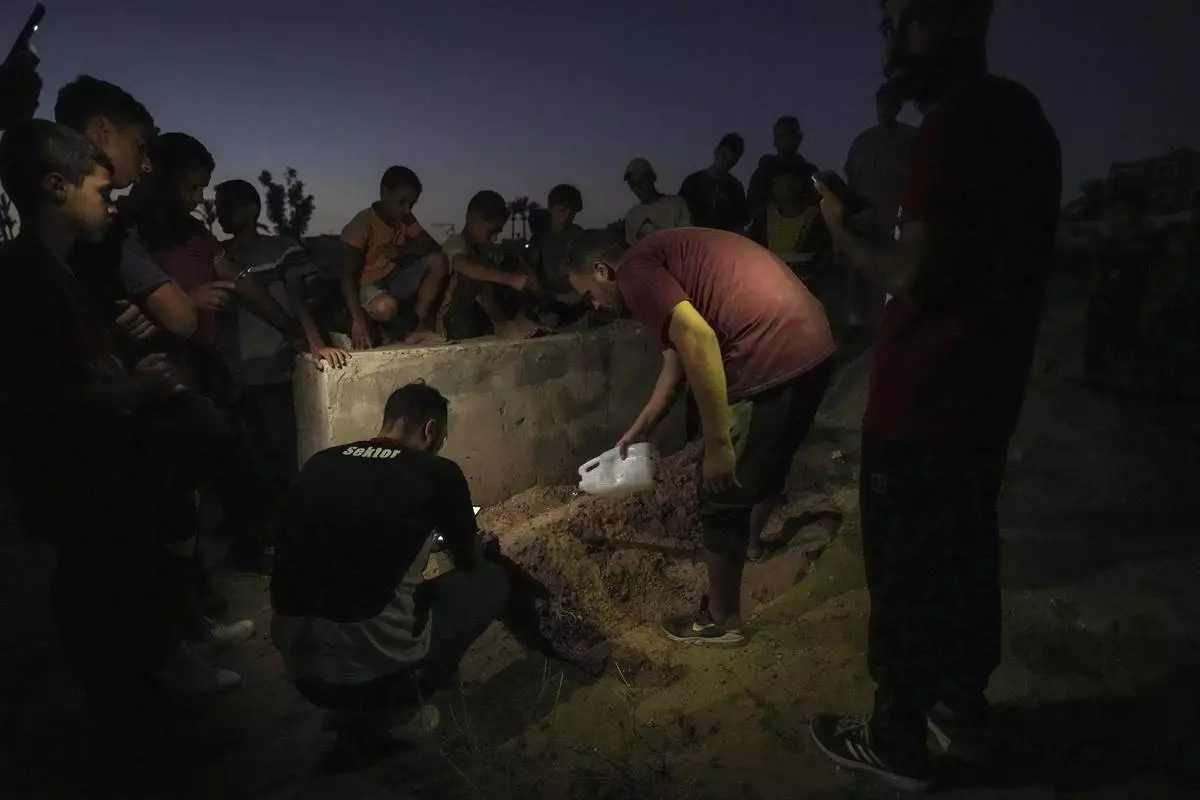
Palestinian mourners bury their loved one at the cemetery in Deir al-Balah, Gaza Strip, Friday, Aug. 9, 2024. (AP Photo/Abdel Kareem Hana)
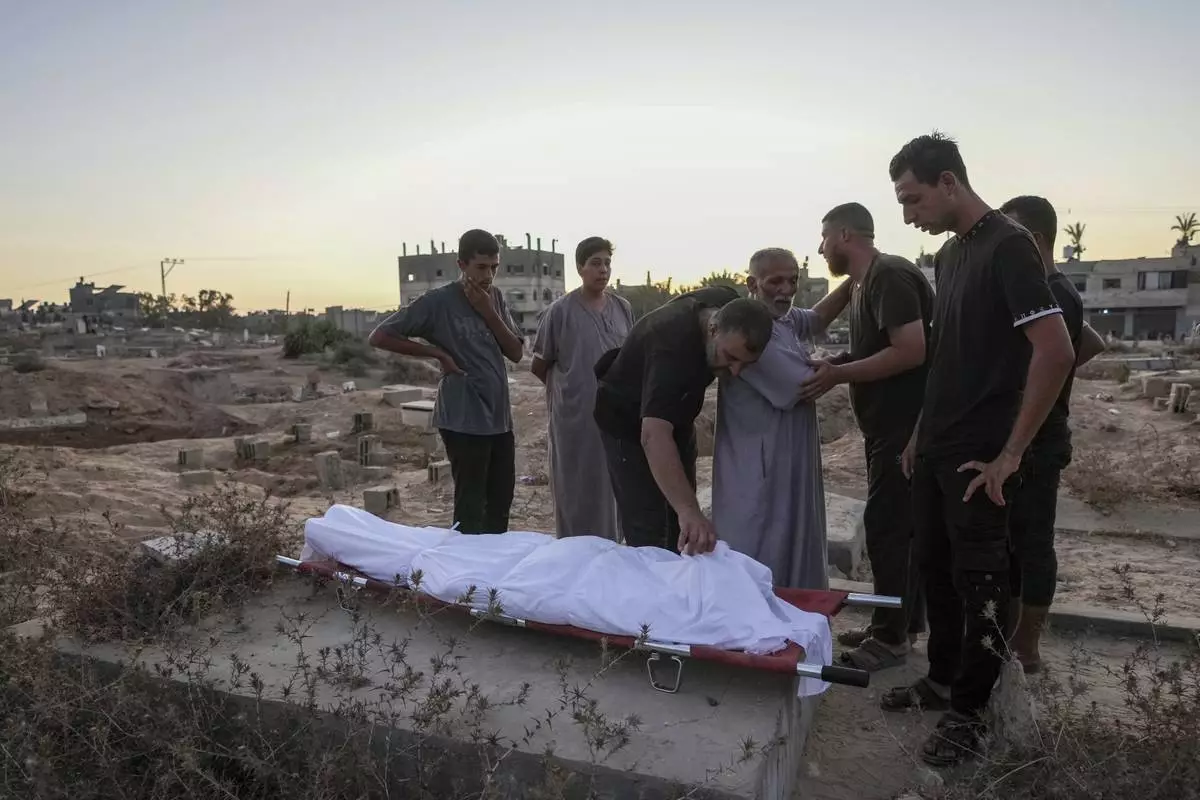
Palestinian mourners prepare to bury their loved one at the cemetery in Deir al-Balah, Gaza Strip, Friday, Aug. 9, 2024. (AP Photo/Abdel Kareem Hana)
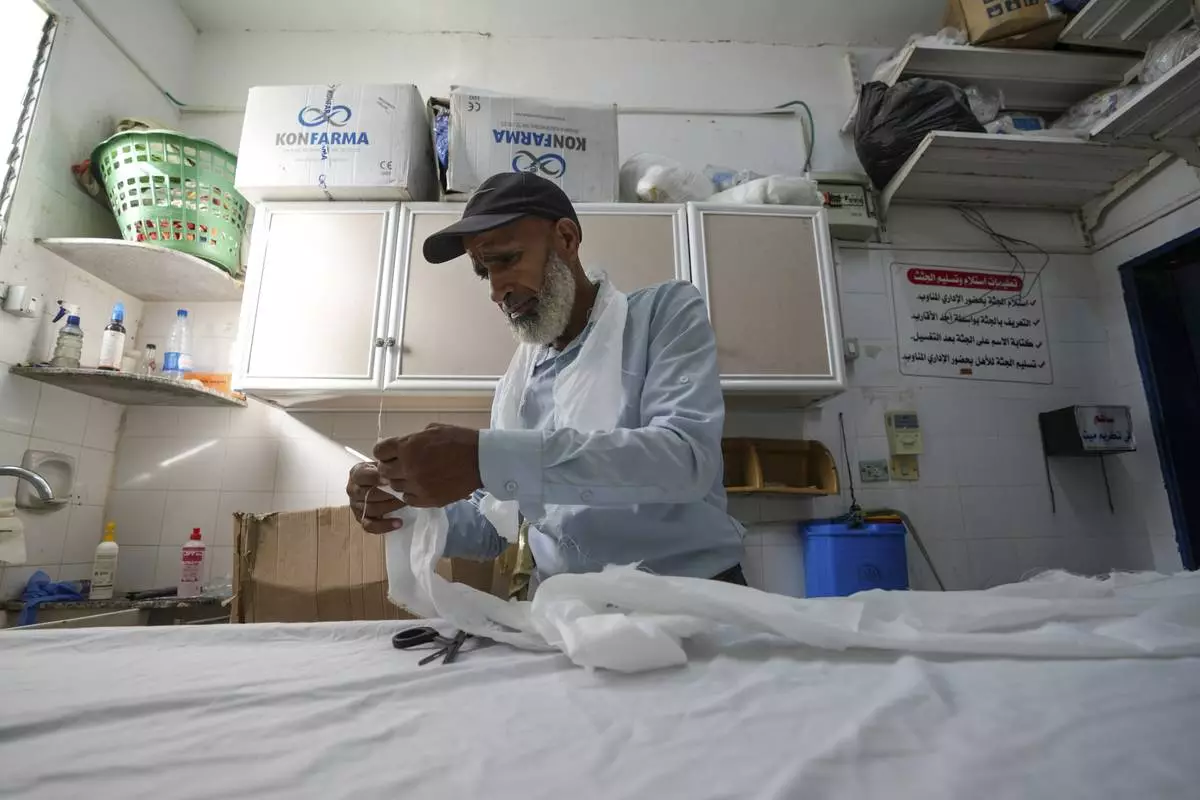
Palestinian morgue worker Nawaf al-Zuriei, a morgue worker prepares a burial shroud at at Deir al-Balah's Al-Aqsa Martyrs Hospital in the Gaza Strip, Friday, Aug. 4, 2024. Those killed by the war are considered ritually pure under Islamic tradition, so their bodies are not washed, he said. Workers cover the damaged bodies in plastic to avoid bloodstains on white shrouds. (AP Photo/Abdel Kareem Hana)
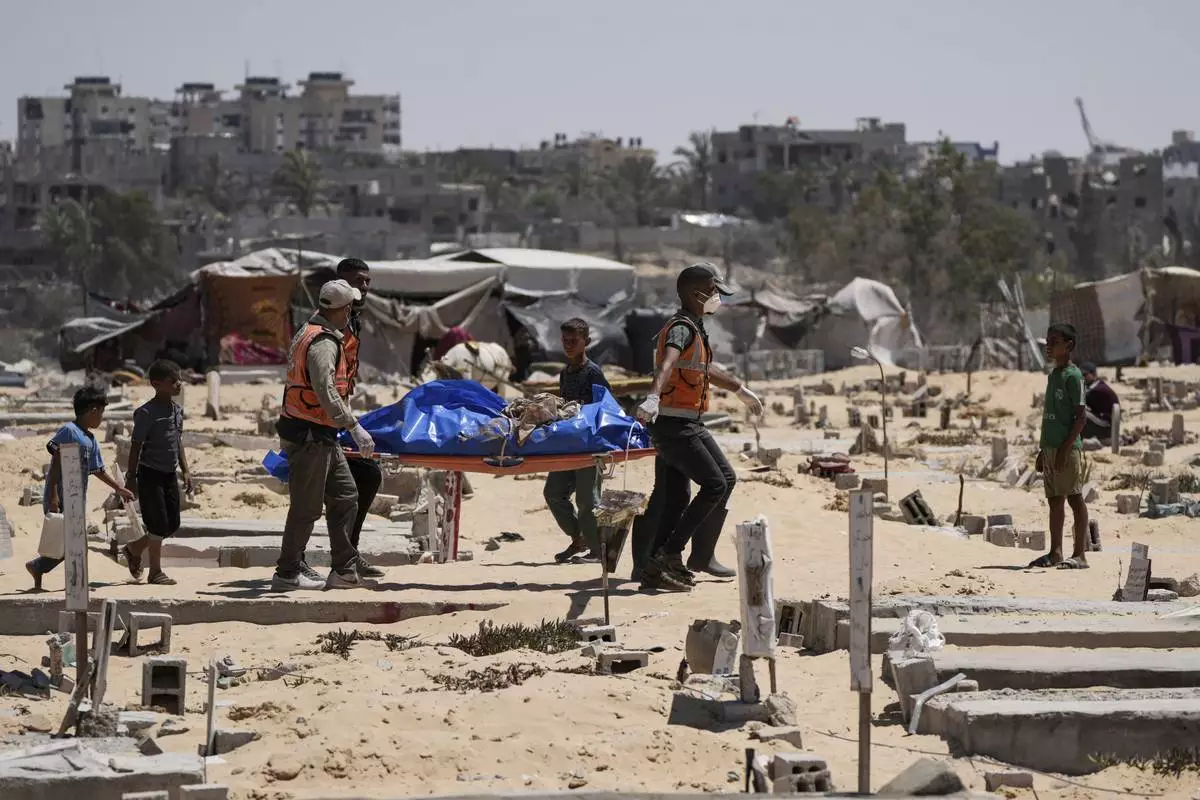
FILE - Workers carry a body, one of more than 80 bodies returned by Israel, to a cemetery in Khan Younis, Gaza Strip, Monday, Aug. 5, 2024. (AP Photo/Abdel Kareem Hana, File)
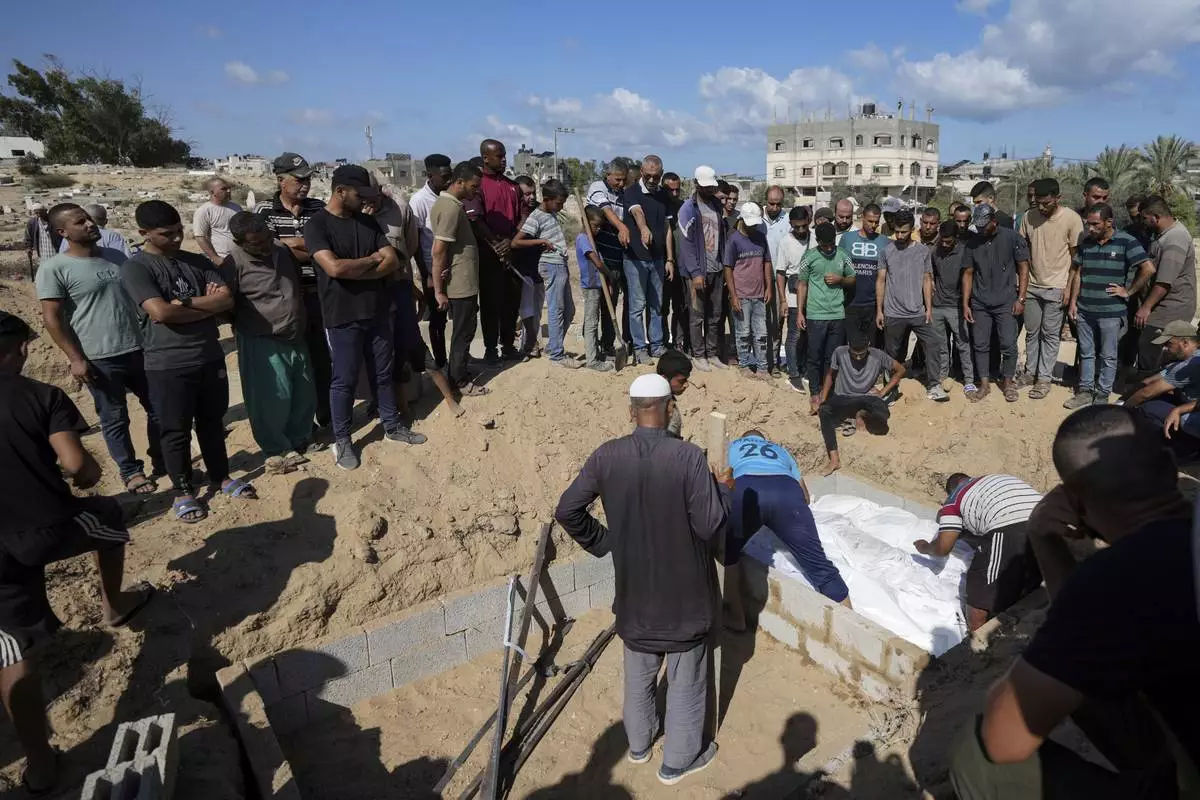
Palestinian grave digger Sa'di Baraka, center, oversees a burial in the cemetery in Deir al-Balah, Gaza Strip, Saturday, Aug. 10, 2024. (AP Photo/Abdel Kareem Hana)
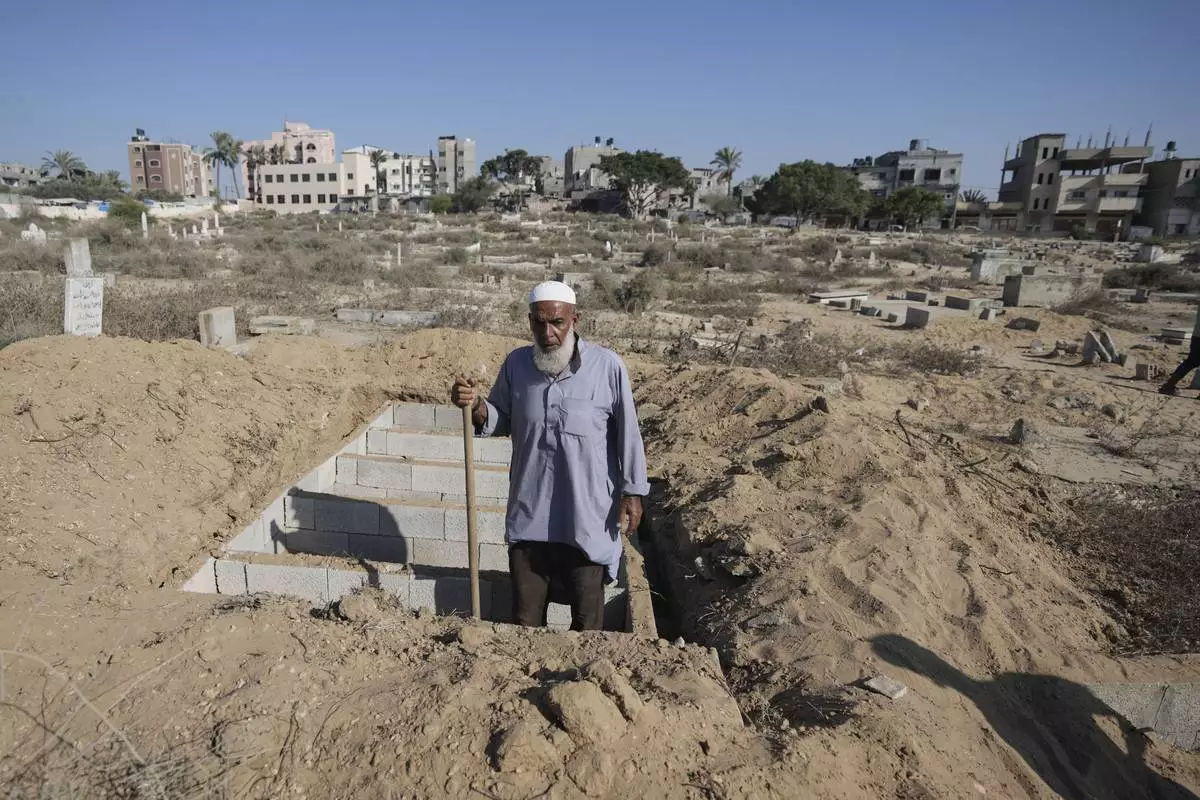
Palestinian grave digger Sa'di Baraka pauses while digging new graves in a cemetery in Deir al-Balah, Gaza Strip, Friday, Aug. 2, 2024, making room for more killed in the 10-month-old war. "We bury martyrs," Baraka said. "Sometimes we make graves on top of graves." (AP Photo/Abdel Kareem Hana)
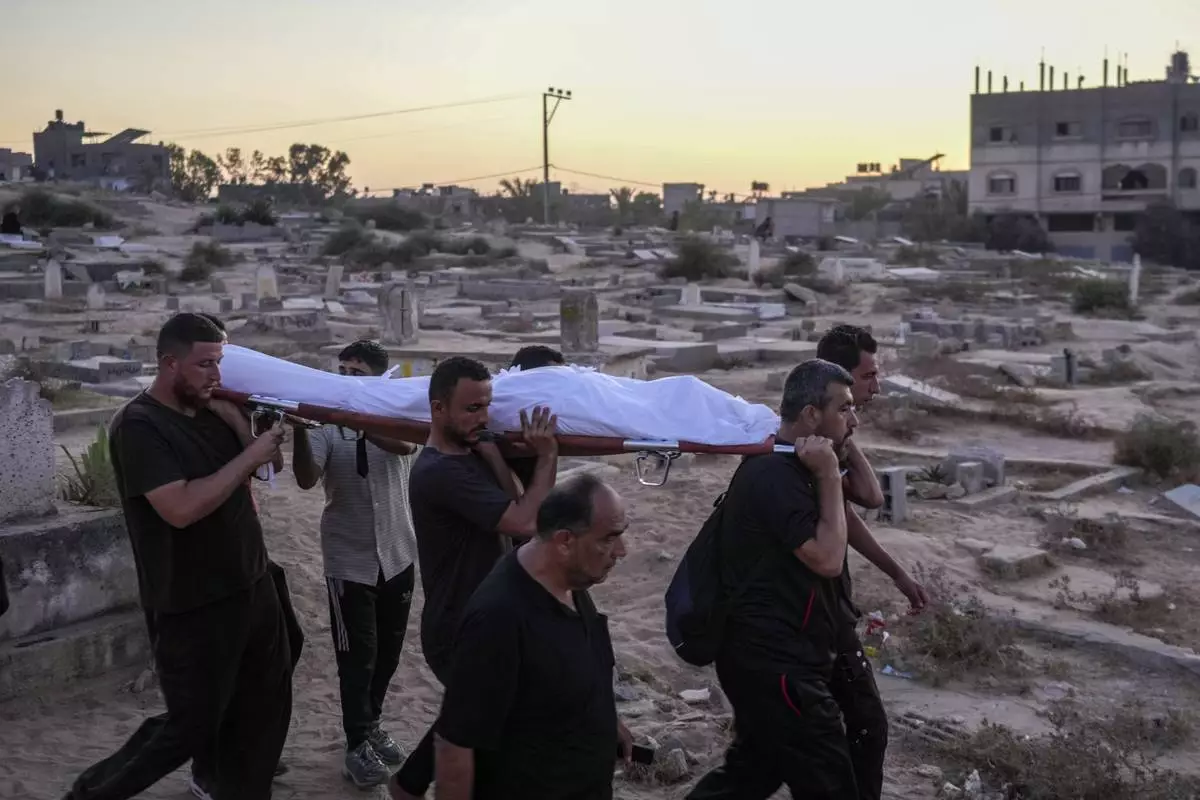
Palestinian mourners carry their loved one for burial at the cemetery in Deir al-Balah, Gaza Strip, Friday, Aug. 9, 2024. (AP Photo/Abdel Kareem Hana)


